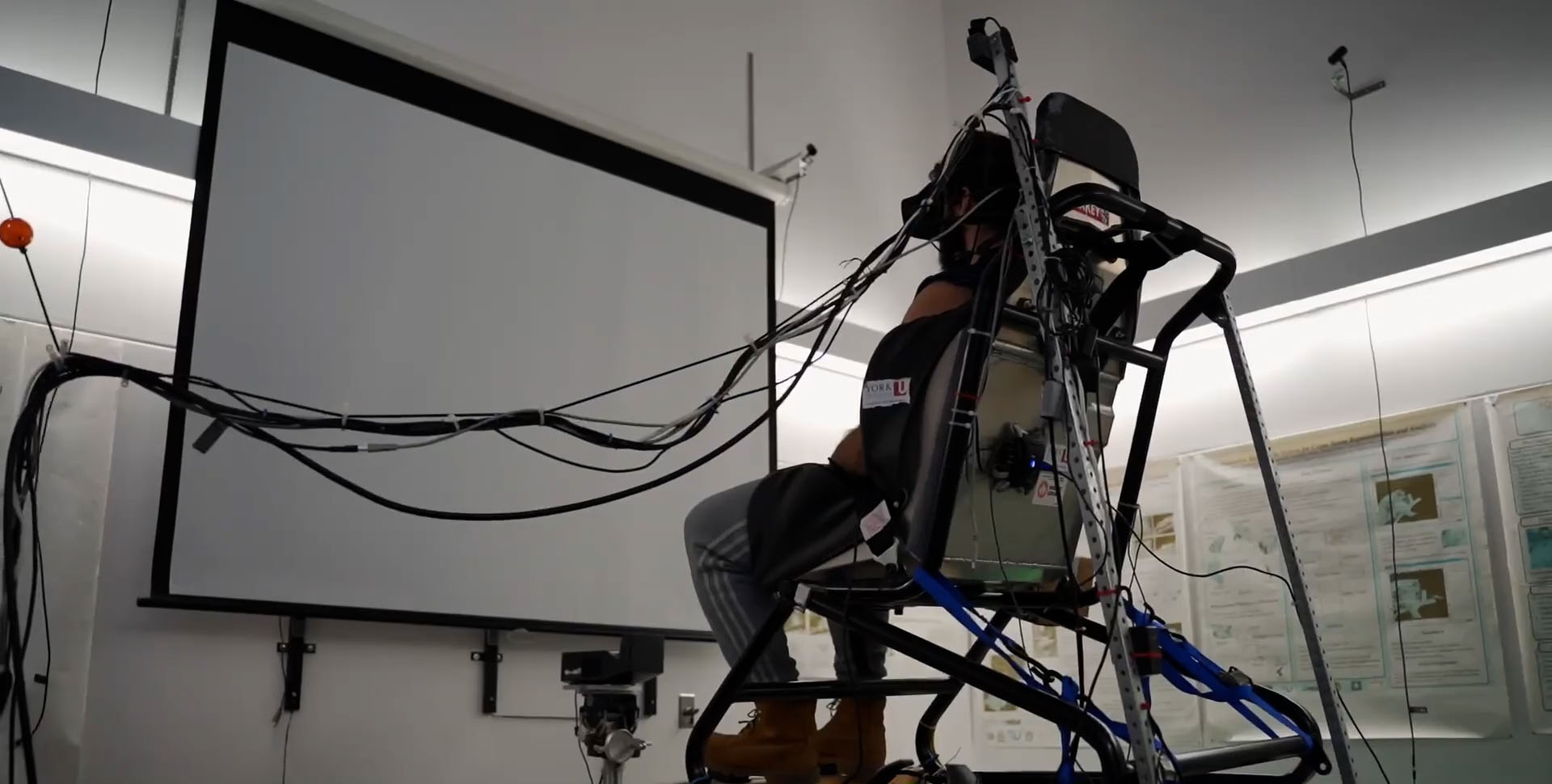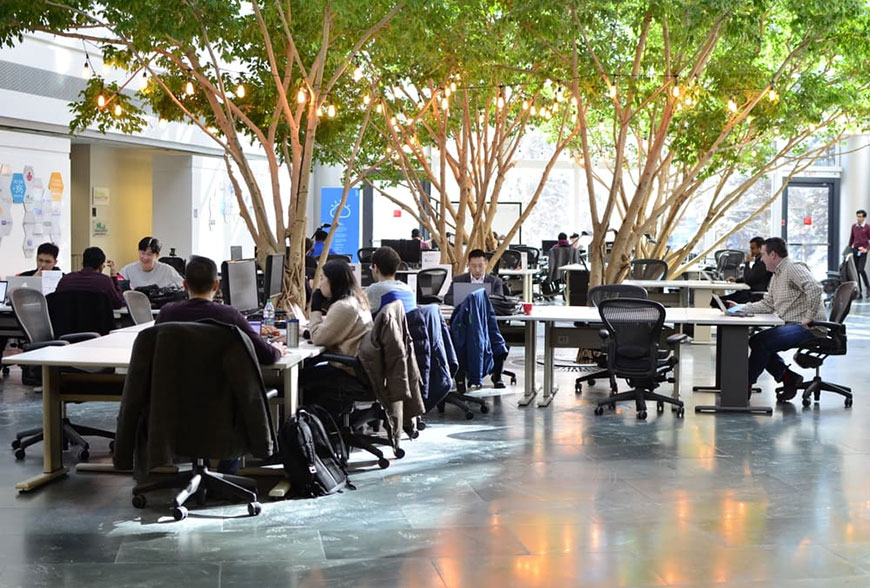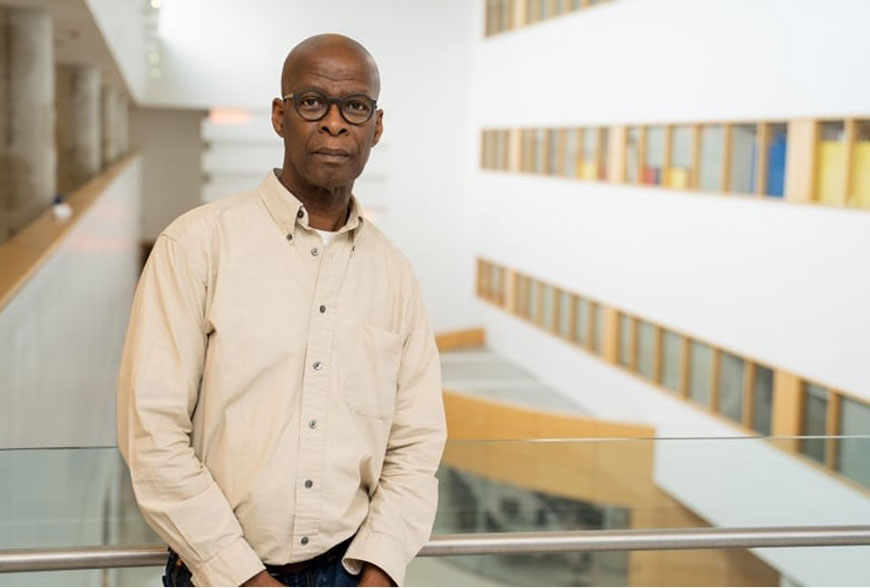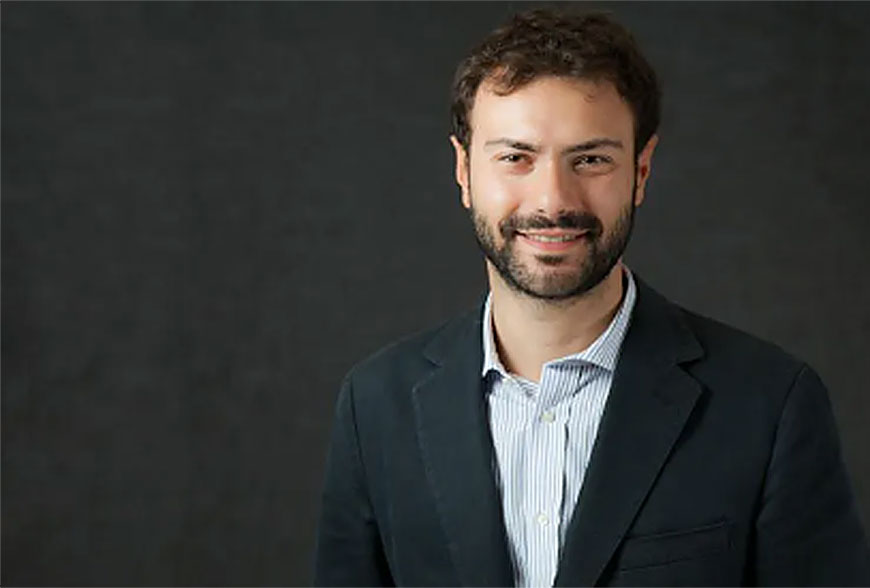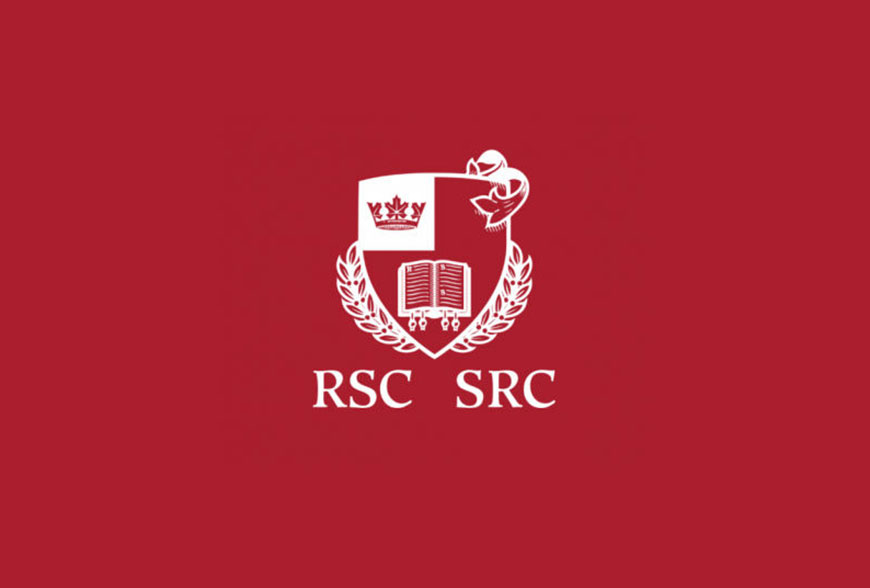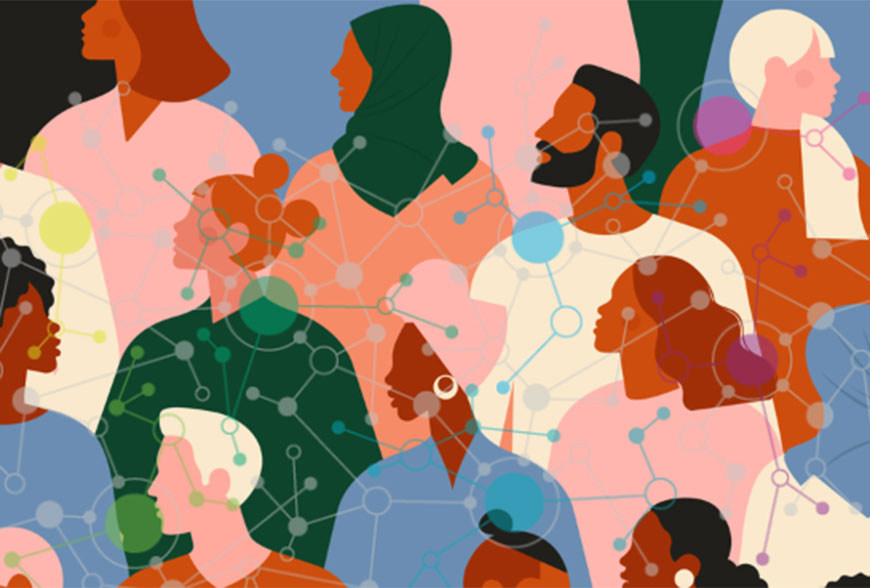York is leveraging its position as a Living Lab to test and generate new ideas and innovations that respond to society’s most pressing needs and advance its vision for a more sustainable, equitable and inclusive future.
From developing ground-breaking entrepreneurial programs such as agri-food and women-led professional services ventures to investing in the success of Black entrepreneurs, the University’s knowledge stewardship is propelling Ontario as a global knowledge economy leader while its commitment to knowledge mobilization builds the kind of individual and collective capacity required to make a lasting local and global impact.
$111.45M+
in sponsored research funding in 2021-22.
$2.4M
invested to support decolonization, equity, diversity, inclusion in research.
128
new ventures joined YSpace, compared to 93 in previous year.
34
Canada Research Chairs advancing knowledge of space exploration, global health, vision science, digital arts, Indigenous knowledge and social justice.
As one of the most diverse communities and fastest-growing technology hubs in Canada, Markham is poised to become the next global tech leader with the development of four new approved research clusters at Markham Campus.
The research clusters – AI & Society, FinTech, Digital Cultures and Public Policy – will provide students and researchers with access to advanced computing equipment and technology to conduct research, facilitate innovation, and participate in scholarly pursuits that are responsible, sustainable and inclusive.
SDG8: Decent Work and Economic Growth
Increasing research is core to York’s objectives in Knowledge for the Future. In the past year, York has achieved remarkable success in research and innovation, achieving record levels in research funding and the highest amount in the University’s history for tri-council funding and sponsored income with more than $106 million in total external research income in 2021.
A recognized leader in the humanities and social sciences, York was awarded more than $14.5 million in funding from the Social Sciences & Humanities Research Council of Canada (SSHRC), including close to $10 million in Partnership Grants for long-term research projects in anti-homelessness, antimicrobial resistance, 2SLGBTQ+ poverty and Indigenous rights and reconciliation.
Meanwhile, the Canadian Institutes for Health Research (CIHR) awarded $7.5 million in funding to York to support transformative projects such as Associate Professor of Health Yvonne Bohr’s $1,797,752 community-directed study in virtual mental health resources for remote Nunavut communities. By partnering with Indigenous collaborators and knowledge users to support Inuit youth resilience, the interdisciplinary and international research team is advancing SDG 3: Good Health and Well-Being.
To further promote York’s contributions toward creating a sustainable future, the Natural Sciences & Engineering Research Council awarded $14.4 million in funding to the University, including almost $500,000 over five years to fund a project led by Professor Shooka Karimpour at the Lassonde School of Engineering that aims to mitigate the spread of plastics in aquatic systems, supporting SDG6: Clean Water and Sanitation.
SDG17: Partnership for the Goals, SDG11: Sustainable Cities and Communities
As part of its ongoing work to address systemic anti-Black and anti-Indigenous racism, York University has committed $2.4 million over the next three years to support EDI-related scholarships through the University Fund.
Two new funds were created: the York Black Research Seed Fund and the Indigenous Research Seed Fund. Both funds reflect the University’s commitment through the Strategic Research Plan and the UAP to accelerate research growth, diversify scholarly and artistic output, and address systemic racism against Black and Indigenous scholars.
The Black Research Seed Fund was awarded to six scholars. Three recipients in the Open Research stream received $25,000 each for a duration of 24 months. Three recipients in the Collective Research stream — which recognizes Black early-career researchers who plan to collaborate with a Black scholar on a 24-month research project — received $25,000. An additional $50,000 of research funds were provided to the Centre for Research on Latin America and the Caribbean (CERLAC) as well as the Harriet Tubman Institute for research on Africa and the Diasporas.
The Indigenous Research Seed Fund, created in response to recommendations made in the Decolonizing Research Administration Action Plan, will provide $1 million over three years to emerging and established Indigenous scholars. A call for applications was administered by the University’s newly formed Centre for Indigenous Knowledges and Languages and in May 2022, ten scholars were awarded a total of $204,298 in funding.
Both funds build on the University’s ongoing commitment to support emerging and established Indigenous and Black scholars.
UNSDG 10: Reduced Inequalities
A $100,000 investment by auto magnate and former York University governor Frank Stronach in Lassonde’s Bergeron Centre for Excellence in Engineering is transforming York’s Keele Campus into a living lab for the next generation of electric vehicles known as the SARIT (Safe, Affordable, Reliable, Innovative Transit).
Since April 2022, faculty, students and staff have been testing and developing SARIT prototypes to advance the future of sustainable energy. This collaboration underscores York’s commitment to innovation, work-integrated learning, and building sustainable cities and communities through strategic partnerships.
The funds are part of a wider partnership between Stronach and the University and will also support research-funding opportunities in sustainable urban agriculture.
SDG 7: Affordable and Clean Energy, SDG 11: Sustainable Cities and Communities
York’s pan-university entrepreneurship hub, YSpace, is creating positive change by fostering a community of innovators, entrepreneurs and changemakers. YSpace supported 128 new ventures in 2021-22, including Lactiga, an award-winning venture-backed biotherapeutics company that is unlocking the therapeutic value of human milk to create next-generation anti-infectives that can treat and prevent Primary Immunodeficiency Diseases. Since joining YSpace, Lactiga received USD $2 million National Institutes of Health Emergency Award to advance its COVID-19 therapeutics program.
SDG3: Good Health & Well-Being
York University received a total of $2.15 million in grant funding under the Federal Government Women’s Entrepreneurship Strategy Ecosystem Fund to establish the YSpace ELLA Accelerator and community in March 2020. YSpace Ella celebrated its second anniversary in providing tailored programs to support women entrepreneurs in accelerating the growth of their product- and service-based businesses.
YSpace Ella provides women founders with experts, mentorship, peer circles, hands-on workshops and other resources. YSpace ELLA programs are created and hosted by women, for women, and have a highly intersectional reach, welcoming women of all backgrounds, identities and abilities.
SDG 10: Reduced Inequalities
In May 2022, York University dedicated a U.S. $250,000 fellowship from Meta to its Centre for Vision Research (CVR), creating York’s first-ever corporate-sponsored fund to support graduate students in the field of vision research.
In addition to funding the CVR, which has advanced vision research for decades through ground-breaking studies in fields ranging from 3D displays to computer vision and cognitive neuroscience, the fund will contribute to the Vision: Science to Applications program, York’s interdisciplinary initiative funded by the Canada First Research Excellence Fund. The fund is part of a broader effort to provide students with unique learning opportunities in collaborative environments and advance cutting-edge research and innovation in evolving scientific fields.
SDG17: Partnership for the Goals
The Canada Council for the Arts named Professor of Education Carl James one of the five recipients of the prestigious 2022 Killam Prize for pushing the frontiers of knowledge and making a positive impact on local and global communities. James, who also holds the Jean Augustine Chair in Education, Community and Diaspora, was recognized in the category of Social Sciences for his research leadership in the areas of equity in education, race and ethnic relations.
This recognition is one of the many awards James has received during his career for his outstanding contributions to social equity and anti-racism education, which are aligned with York’s mission to eliminate systemic racism in educational institutions, workplaces, and across society.
SDG 10: Reduced Inequalities
The Canada Research Chairs (CRC) program aims to attract and retain some of the world’s most promising minds from all disciplines. This year York welcomed three new and two renewed Canada Research Chairs for a total number of 34 chairholders.
In June 2022, Professor of Law Valerio De Stefano was awarded a Tier 2 CRC in Innovation, Law and Society. De Stefano’s research examines the role of AI systems on the workforce and the potential regulatory options available to lawmakers. His research aims to bring regulation up to pace with technology and support a future where AI systems are equitable and responsible. His Tier 2 CRC is valued at $600,000 over five years.
SDG9: Industry, Innovation, and Infrastructure
The Royal Society of Canada (RSC) recognizes leading intellectuals, scholars, researchers and artists through several award programs. Fellows have made remarkable contributions to the arts, the humanities and the sciences, and Canadian public life more broadly. The College of the New Scholars, Scientists and Artists recognizes emerging research excellence. The RSC also recognizes outstanding achievement through awards and medals. This year, York added four new Fellows, one new College Member and a Prize winner.
Professor Philip Girard, Osgoode Hall School of Law, was elected as a Fellow for his prize-winning work on the legal history of Canada.
Jennifer Hyndman, associate vice-president research and professor at the Faculty of Environmental & Urban Change was elected as a Fellow for her research on geographies of forced migration, ethnography of the international refugee regime, feminist geopolitics, critical refugee studies and extended exile.
Professor Michele Johnson, Faculty of Liberal Arts & Professional Studies, was elected as a Fellow and recognized for her international leadership in Black History.
Professor Christina Petrowska Quilico, Faculty of Arts, Media, Performance & Design, was elected as a Fellow for her celebrated career as a classical and contemporary pianist and for championing Canadian music.
Professor Jane Heffernan, Faculty of Science, was elected as a Member of the Royal Society of Canada’s College of New Scholars, Artists and Scientists in recognition of her leadership in infectious disease modelling.
Professor Poonam Puri, Osgoode Hall School of Law, received the Yvan Allaire Medal for her work as one of the world’s leading scholars of corporate governance, corporate law, securities regulation and investor protection.
SDG11: Sustainable Cities and Communities
The Catalyzing Interdisciplinary Research Clusters (CIRC) is a ground-breaking new program established by York University to foster interdisciplinary research with a focus on the SDGs.
In December 2021, York invested $3.5 million to support seven projects over three years, building on York’s research leadership in areas of global importance, including disaster risk and governance, artificial intelligence and society, digital cultures and financial technologies. A further six proposals received $75,000 for one year.
The program supports novel research approaches that will expand on key institutional initiatives such as the Markham Campus and the Vaughan Healthcare Centre Precinct. The projects are exploring climate change, youth and planetary well-being, disaster and health emergency in urban centres and Indigenous climate leadership.
York is the top-ranked University in Ontario for collaborative research publications. The CIRC program will continue to advance York’s leadership in interdisciplinary research.
SDG17: Partnerships for the Goals
York is a burgeoning centre of excellence for AI with more than 80 AI-related courses across six Faculties, three master’s degrees supported by the Vector Institute for Artificial Intelligence, two AI certificate programs, and over 90 faculty members engaged in AI-related research.
The latest report, Fostering the Future of Artificial Intelligence: Report from the York University Task Force on AI & Society makes key recommendations that include strategic cluster hiring of researchers with interests in core technical topics; developing interdisciplinary curriculum initiatives with new academic programs and research partnerships across faculties; and establishing an ORU to attract students, partners and donors to collaborate on projects.
The rapid pace of artificial intelligence combined with the societal implications of AI will continue to be a key research priority for the University as it poises to become a global centre of excellence for teaching and research in the field.
SDG9: Industry, Innovation, and Infrastructure
York’s 30 organized research units (ORUs) serve as synergistic hubs that bring together interdisciplinary perspectives across all faculties and campuses to mobilize research, collaboration and knowledge-sharing, many in areas related to the SDGs.
Six new ORUs were approved in the last year:
- The Centre for Indigenous Knowledges and Languages supports research involving both traditional and contemporary knowledges, as care-taken, shared, and created by Indigenous scholars located in the University and Indigenous Knowledge holders from communities.
- The Institute for Technoscience and Society (ITS) is a global hub of critical and interdisciplinary research and knowledge mobilization on the relationship between technoscience and society.
- One WATER will greatly enhance our capacity to address the diverse aspects of the ongoing water sustainability crises; engage in interdisciplinary world-class research on sourcing, AI technologies, education and sustainability, resource recovery and others.
- The Centre for Artificial Intelligence & Society (CAIS) unites researchers who are collectively advancing state-of-the-art theory and practice of AI systems, law, governance and public policy. The research focuses on AI systems that address societal priorities and are fair, explainable, reliable and trusted within the realm of healthcare, smart cities and sustainability.
- The Centre for Integrative and Applied Neuroscience (CIAN) mobilizes research to address health, education, industry, and other applications important for the global community around neuroscience.
- The York Emergency Mitigation, Engagement, Response, and Governance Institute (Y-EMERGE) works to transform the way societies understand, manage and govern crises, disasters, and emergencies.
SDG17: Partnerships for the Goals
Learn more about our priorities:
